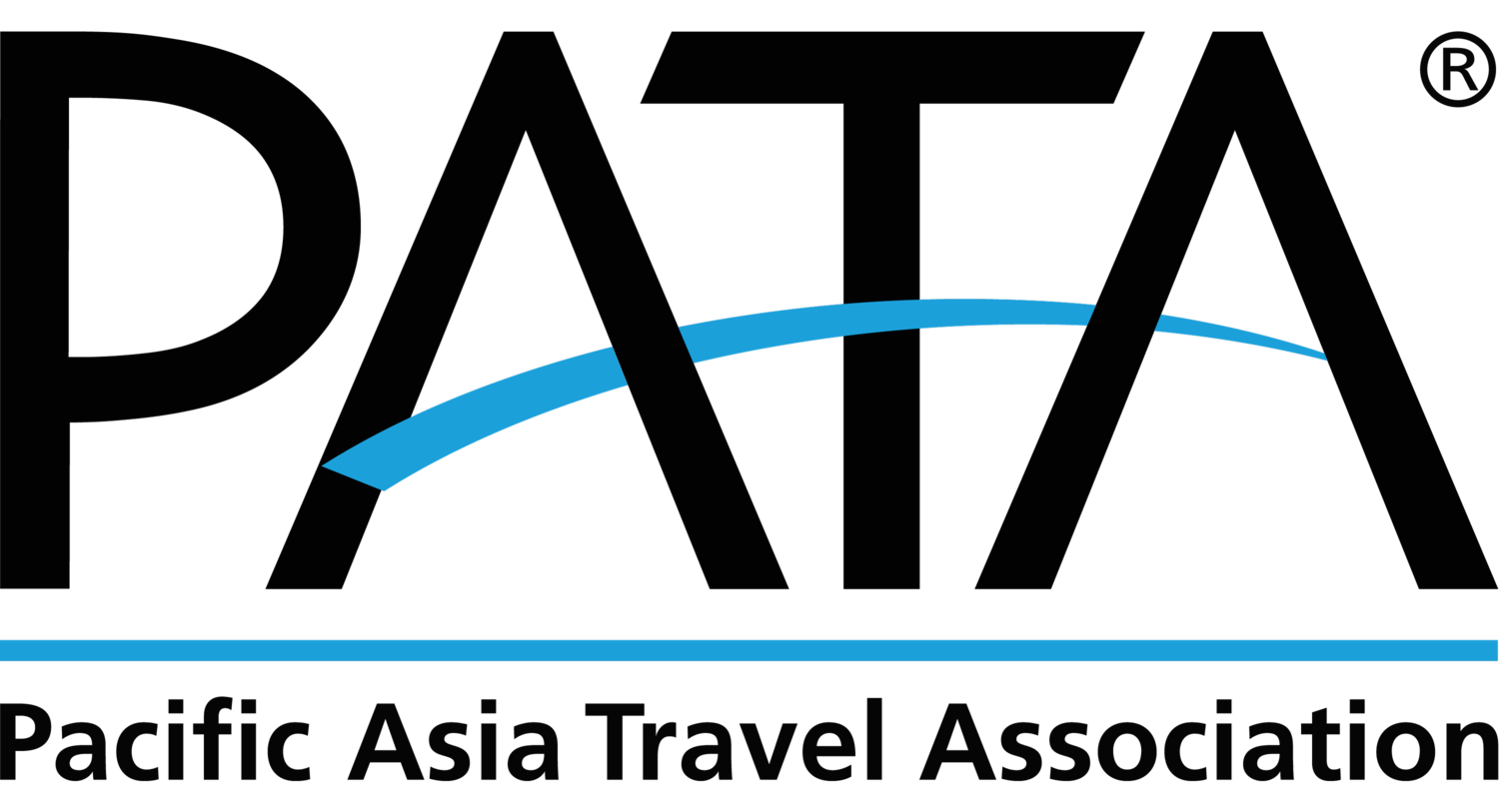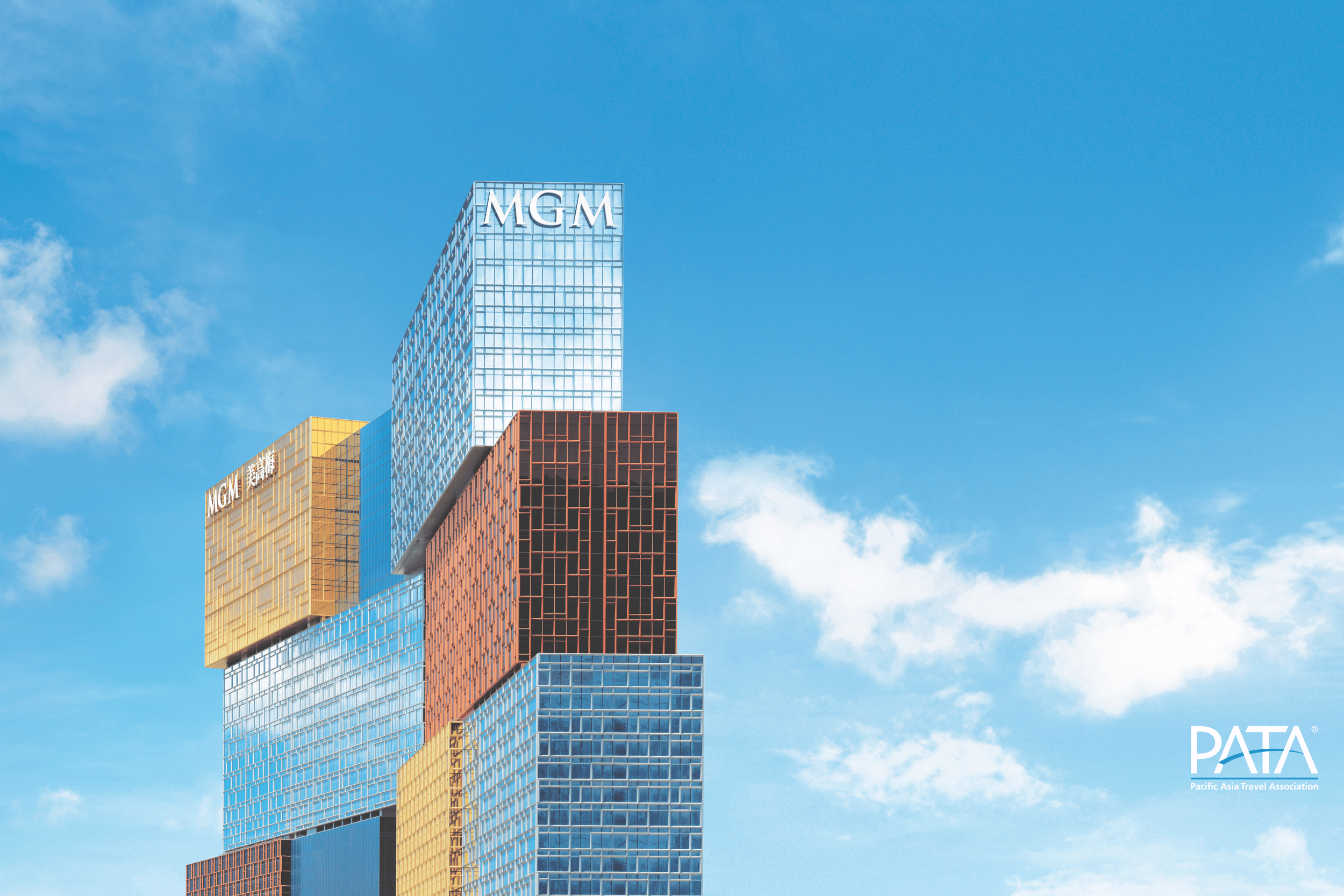PATA and MGM Deliver Training for MICE and Tourism Stakeholders in Macao, China
In response to the COVID-19 pandemic, PATA has been developing and launching various resources, tools and initiatives to support the Asia Pacific tourism industry. The Association’s goal extends beyond aiding the industry’s recovery from the pandemic and proactively preparing it for future challenges; aiming to help Asia Pacific tourism adapt to changes and navigate through evolving landscapes seamlessly.
The Meetings, Incentives, Conferences and Exhibitions (MICE) sector was severely impacted by pandemic-related travel restrictions, social distancing measures and concerns over health and safety. As a result, many events shifted to virtual platforms, resulting in significant financial losses for venues, service providers and destinations dependent on MICE tourism.
At the same time, COVID-19 accelerated the adoption of digital technologies and hybrid event models, as well as heightened the demand for sustainability in event management and operations, permanently altering the landscape of the MICE sector. This shift highlights the need for greater flexibility and innovation to meet evolving participant expectations and ensure continuity in the face of future disruptions.
To support the positive transformation of the Macao MICE tourism sector towards a more sustainable and innovative future, PATA and MGM implemented a two-and-a-half-day capacity-building programme in Macao, China, from September 24-26, 2024. The training, held at MGM Cotai on September 24th and 25th, was tailored for local MICE and tourism stakeholders and addressed the key themes of sustainability, marketing and technology.



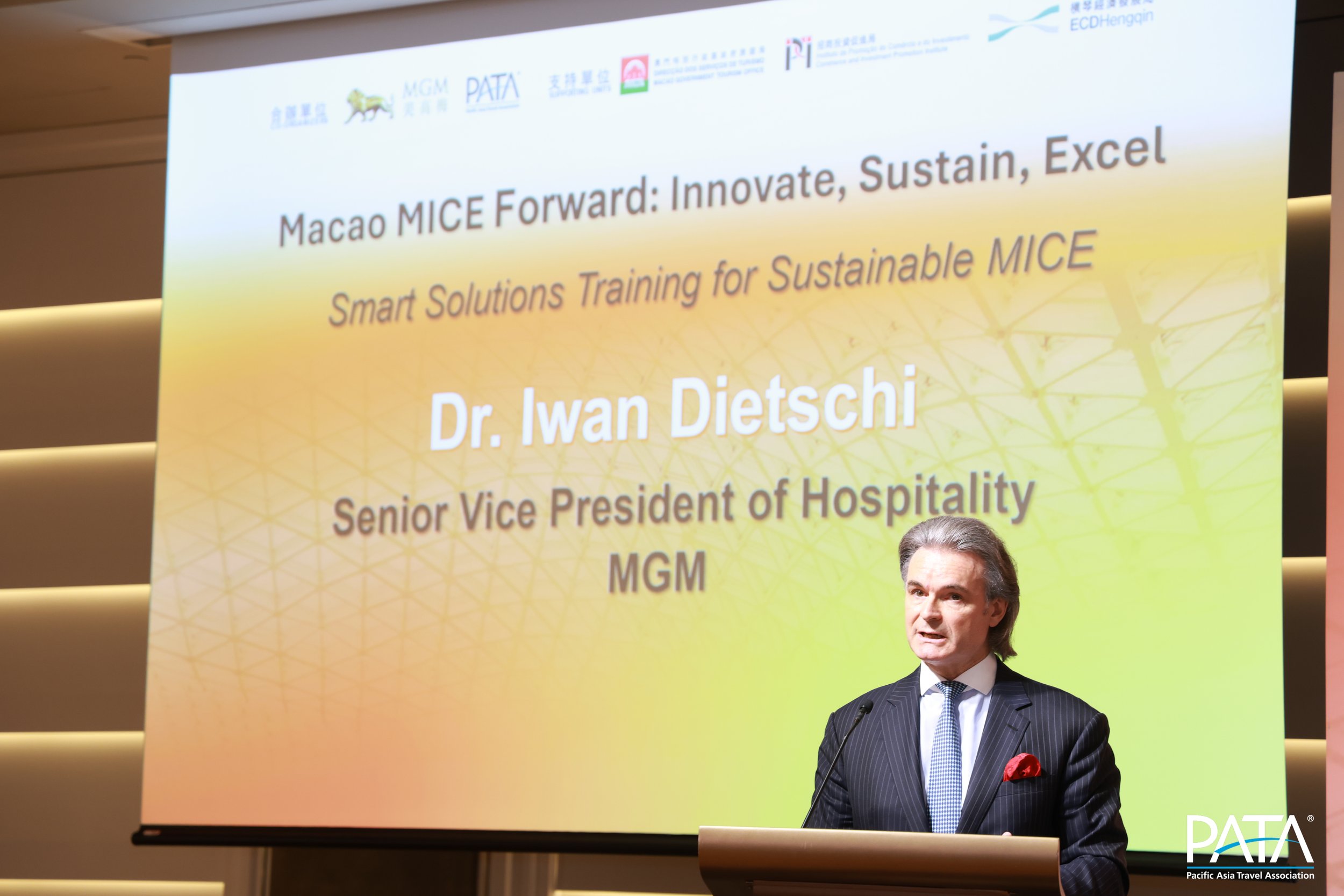
Day 1 – Marketing & Technology
The MICE training programme began on September 24 with welcoming remarks from Maria Helena de Senna Fernandes, Director, Macao Government Tourism Office (MGTO); Elaine Wong, Director, the Commerce and Investment Promotion Institute (IPIM); Vic Lam, Chief of the Division of Tourism, MICE and Commerce, the Economic Development Bureau of Guangdong-Macao In-depth Cooperation Zone in Hengqin; Noor Ahmad Hamid, CEO, PATA; and Dr Iwan Dietschi, Senior Vice President of Hospitality, MGM.
PATA CEO Noor Ahmad Hamid presenting on "MICE Business Outlook"
Following the opening ceremony, PATA CEO Noor Ahmad Hamid delivered a keynote presentation on MICE Business Outlook, where he shared his extensive expertise and insights into current trends, best practices, and the evolving landscape of MICE. Noor highlighted the critical importance of innovation, sustainability and excellence in the MICE sector, with a focus on Macao, China's strategic position within the global and Asia Pacific markets.
Key trends discussed included the rise of hybrid and virtual events, the growing demand for eco-friendly and sustainable meetings, and the integration of technology such as artificial intelligence (AI) and virtual reality (VR) to enhance participant experiences. He also touched upon Macao, China’s strengths, such as its world-class MICE infrastructure and proximity to China, while outlining opportunities in niche markets and sustainability leadership. Last but not least, Noor remarked that the outlook for MICE remains strong, with full recovery expected by 2025.
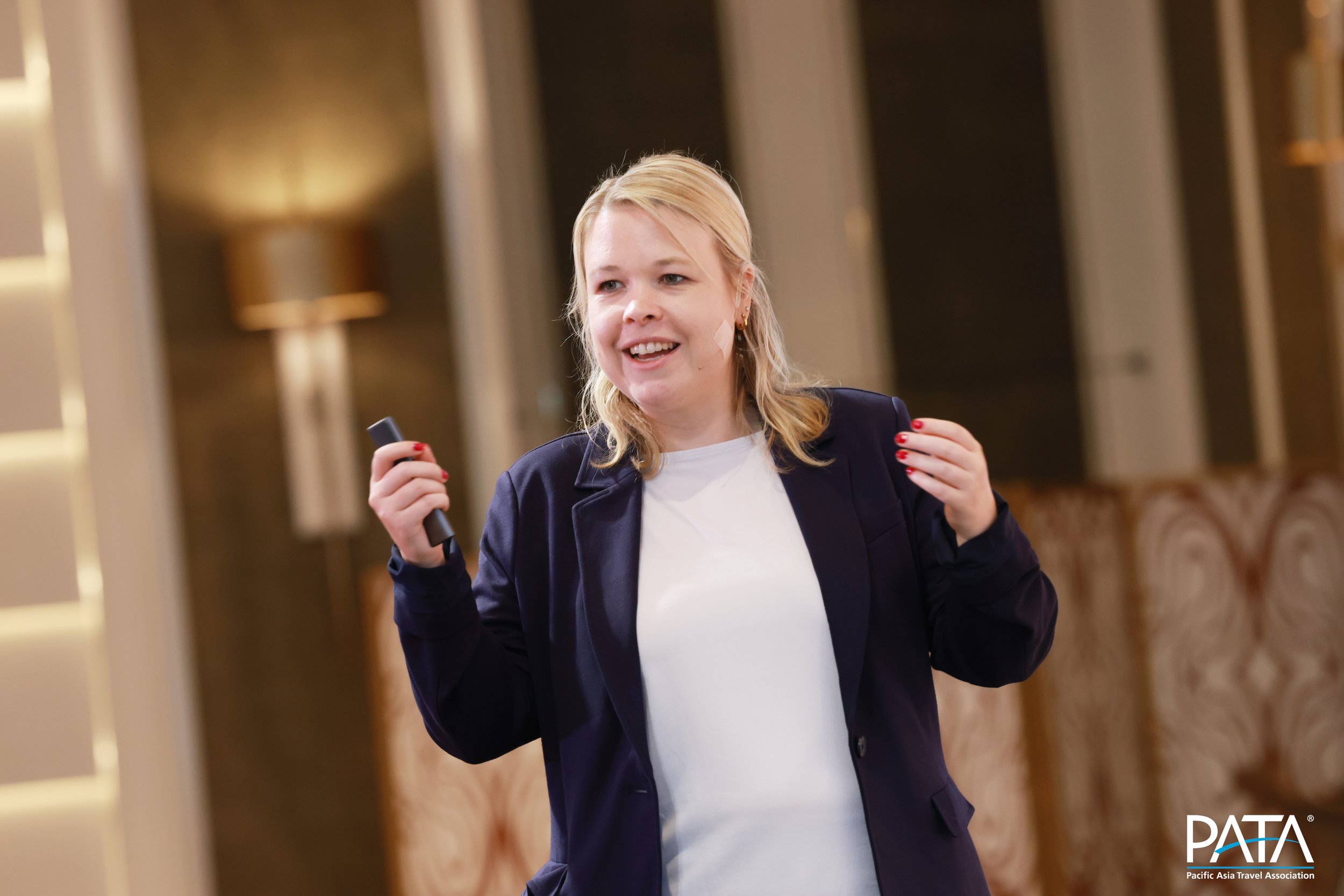
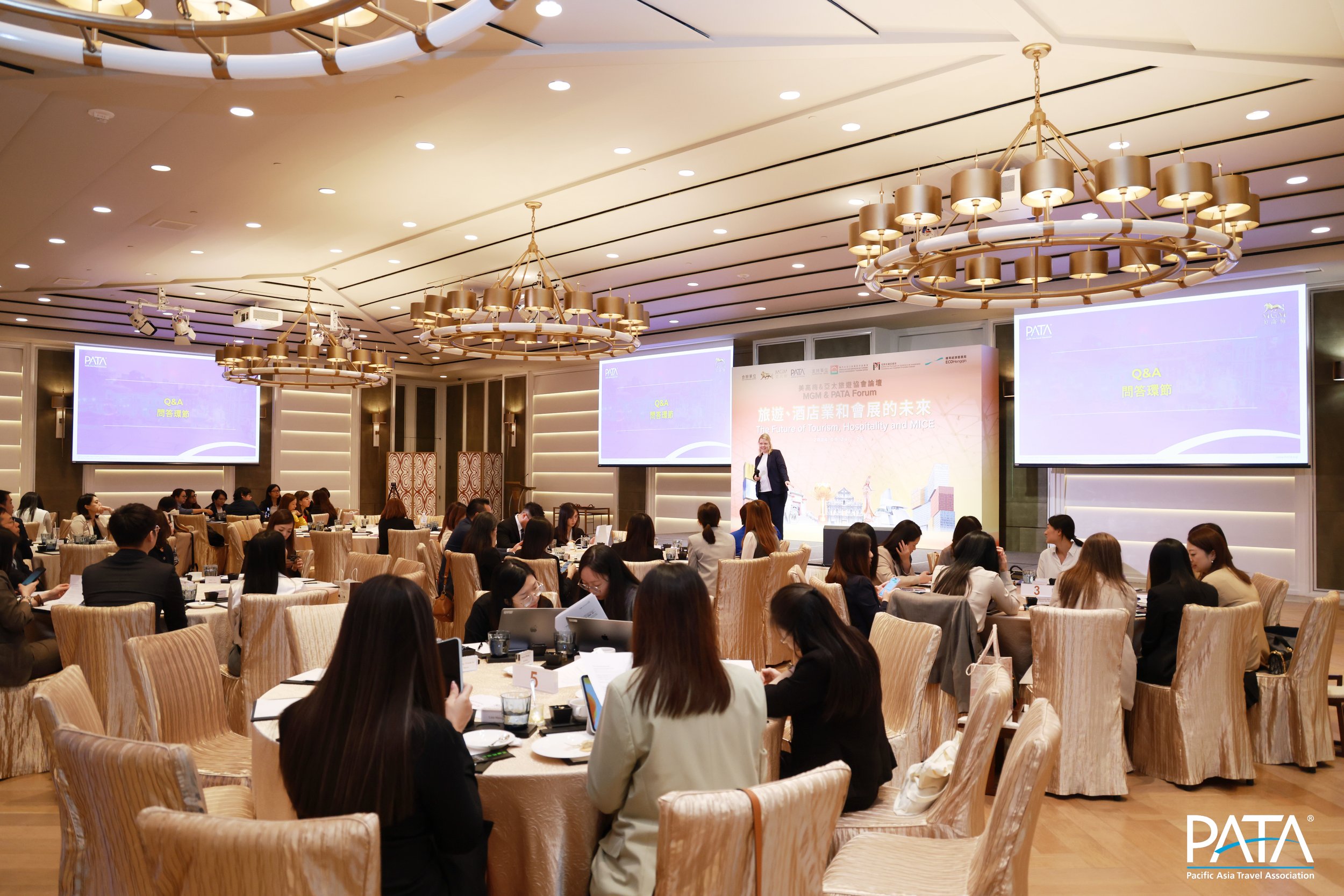

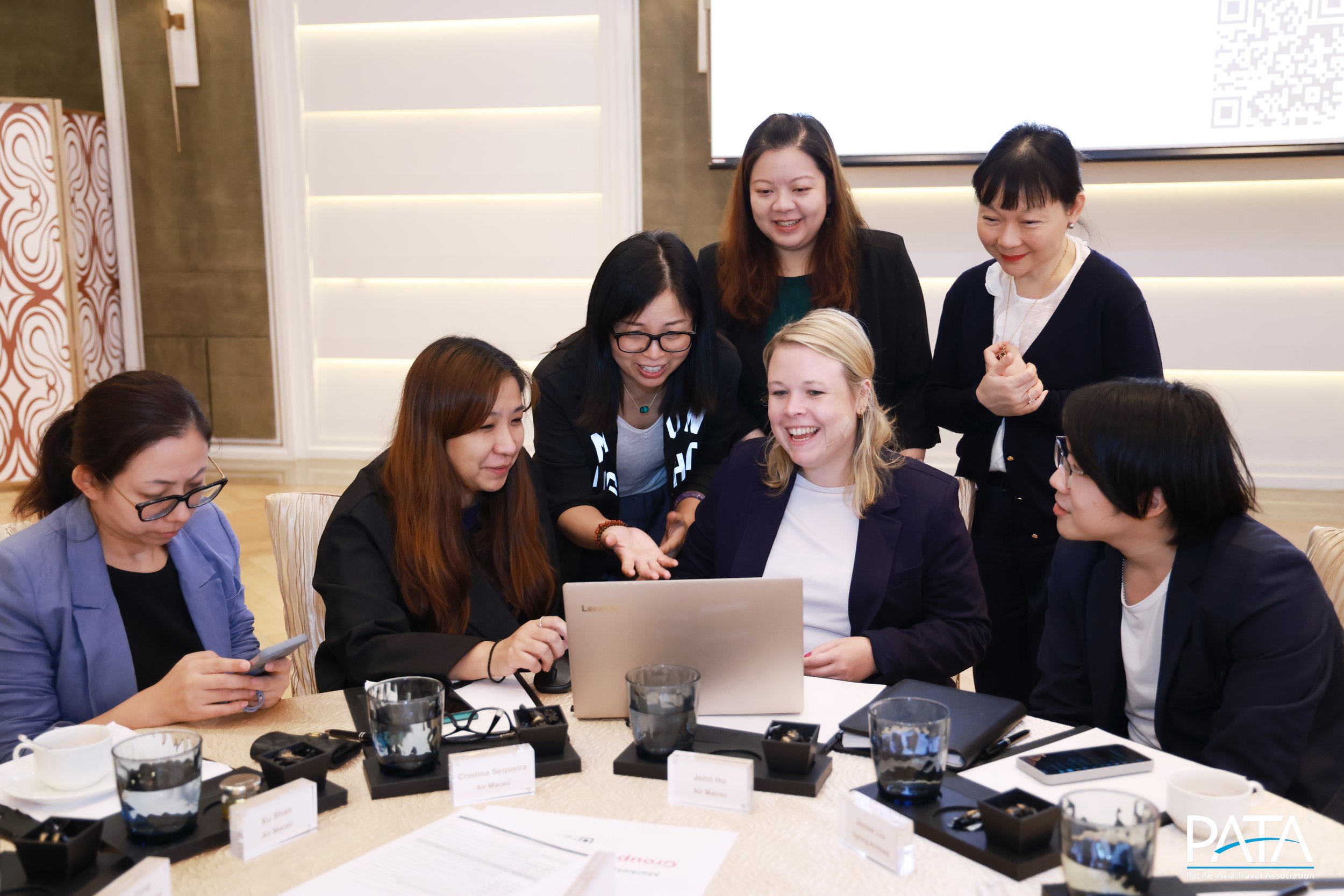
The first training session of the programme delved into Marketing Strategies and the integration of Technology and AI in the MICE Industry, led by Sina Bünte. Founder of Digitalmind.events, an event management consultancy based in Spain, Sina is a Certified Meeting Professional (CMP) with extensive expertise in hybrid, online and in-person events, and is passionate about event technology and AI.
Sina began her session by covering a range of topics related to digital marketing strategies, including website optimisation, content marketing, targeted advertising, social media, email marketing, virtual roadshows, brand ambassadors and augmented reality (AR). To put theory into practice, participants were divided into groups and tasked with developing a digital marketing strategy using one of three tools: social media, brand ambassadors, or AR.
Sina then continued with an advisory session on the implementation of digital tools for event promotion and management, offering tailored recommendations for MGM and Macao, China's MICE stakeholders. She introduced real-life examples, showcasing the use of chatbots, virtual tours, AR and AI avatars in events.
The last topic covered was AI solutions for MICE destinations, marketers and event planners. Sina presented concrete examples of how AI can enhance various aspects of events. The recommended AI tools covered a wide range of functions, including:
AI-driven customer insights and segmentation for targeted campaigns;
creating images, videos and presentations;
transcribing and translating audio;
creating summaries and blog posts from webinars;
and more.
Participants were encouraged to experiment with AI tools in creating different types of marketing materials. Each group was assigned to produce either a promotional video statement using a digital avatar, a newsletter with AI-generated text and images, or a PowerPoint presentation using AI.
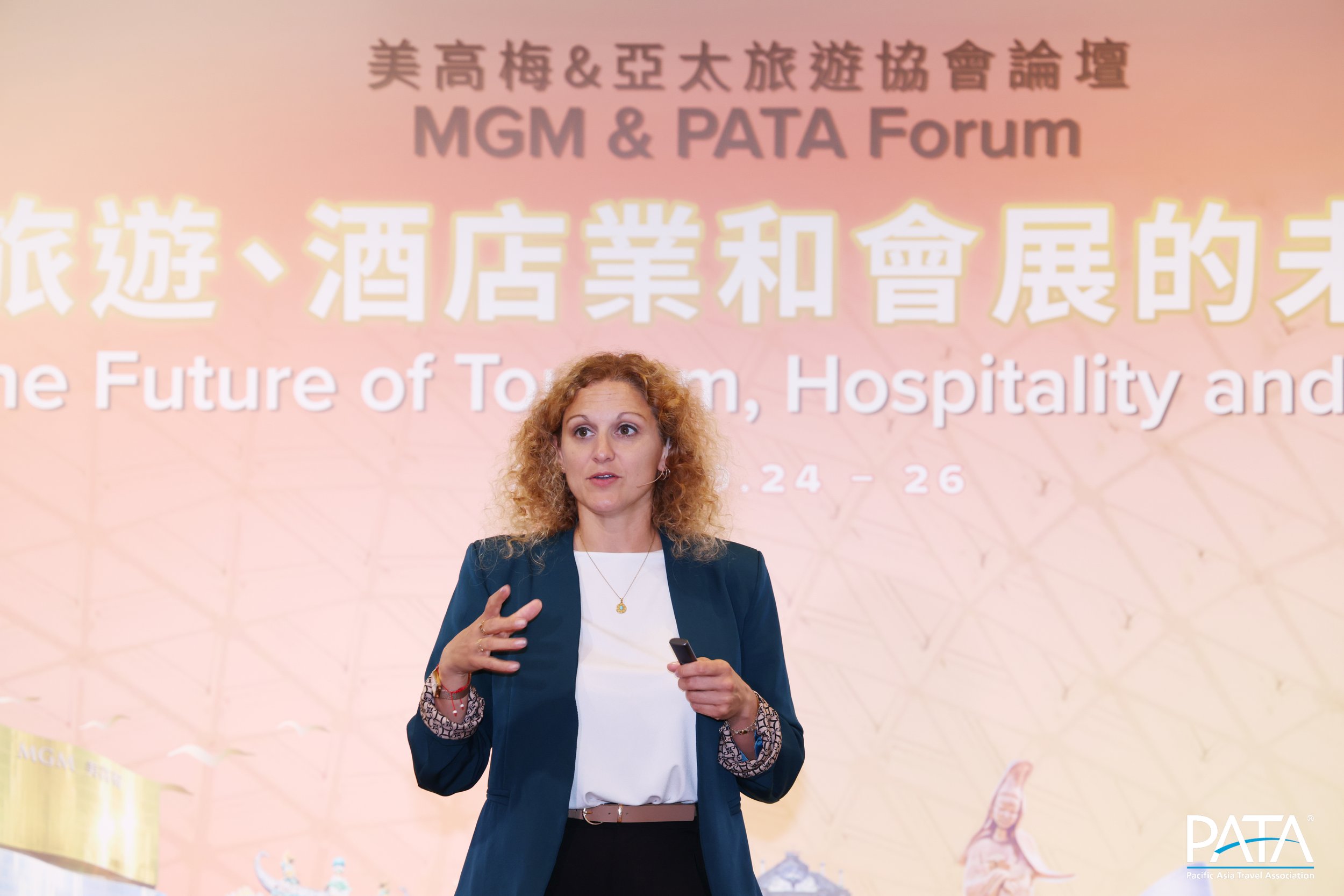
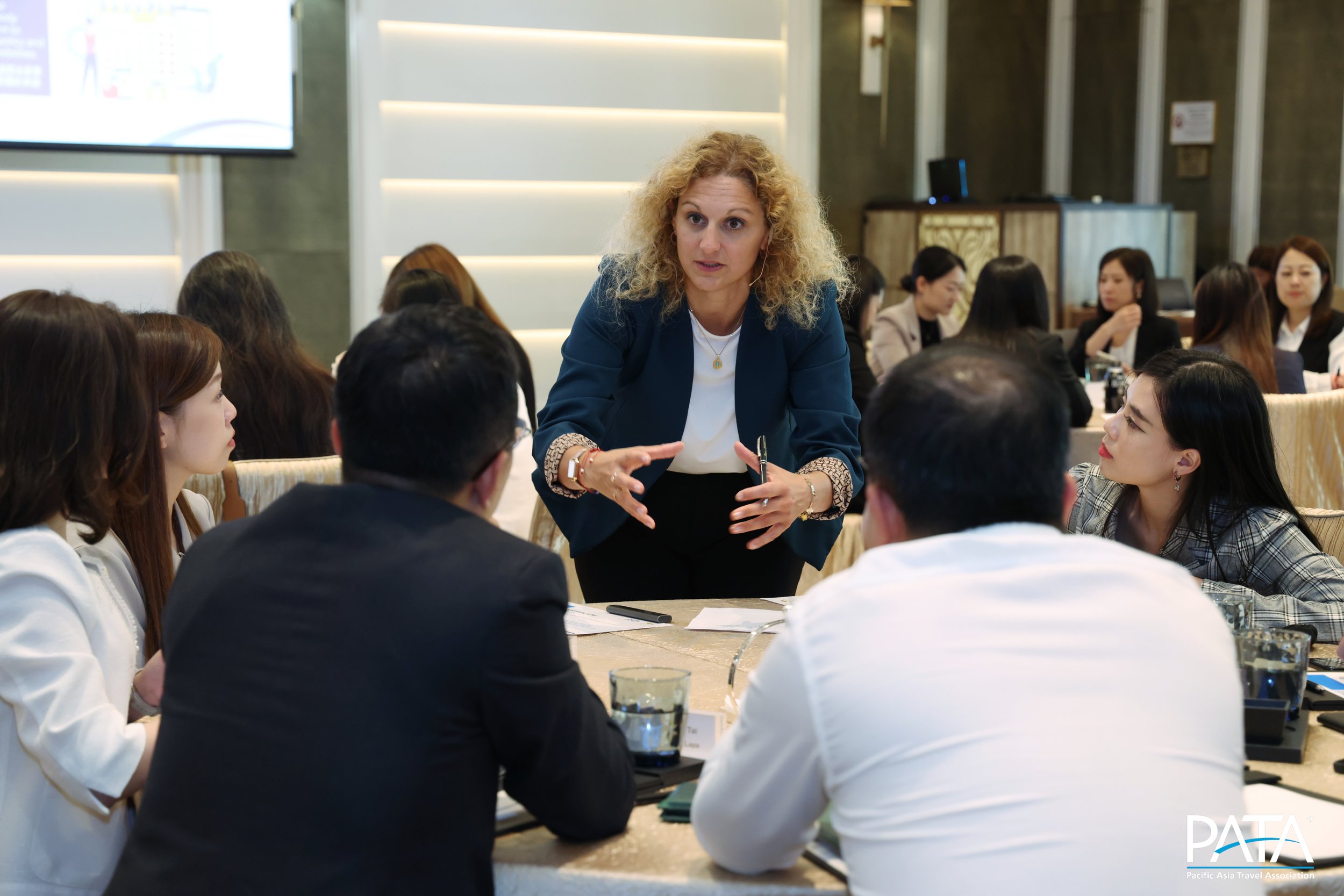
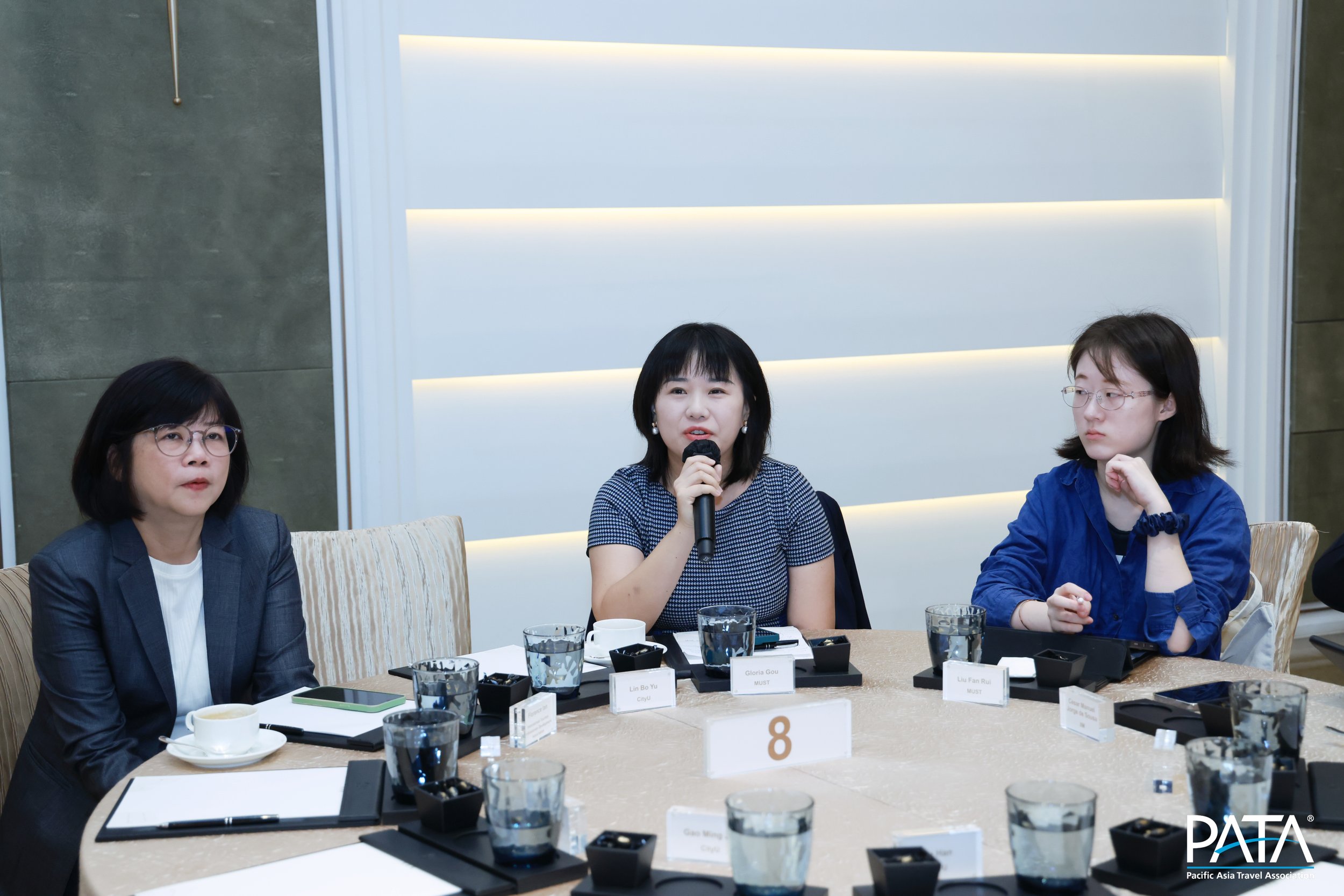
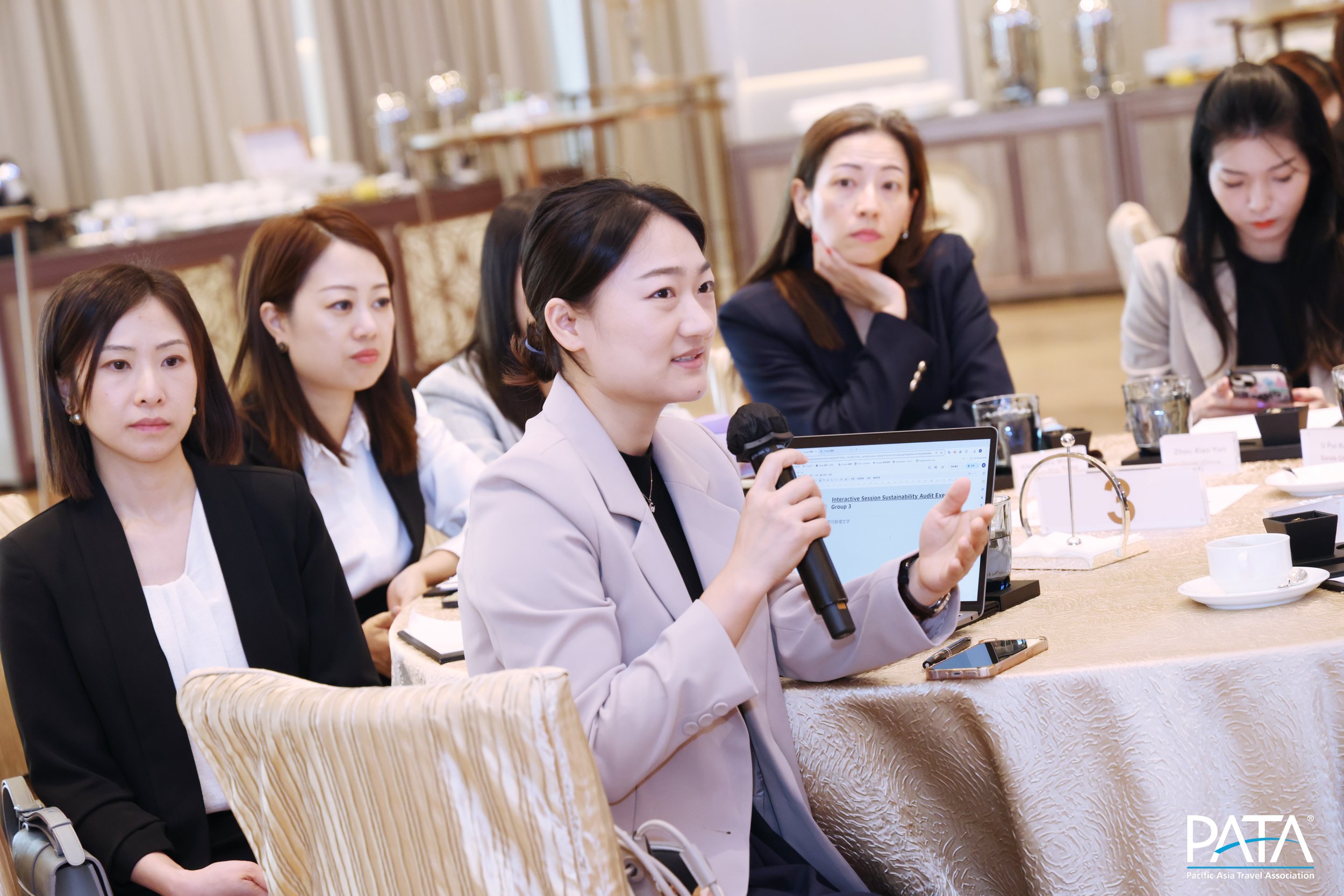

Day 2 – Operational Sustainability
On September 25, the second and last day of training, the topic of MICE Operational Sustainability was covered by Adeline Larroque, founder and auditor at Ennov-Solutions, a France-based consultancy specialised in sustainable events. Adeline is highly passionate about advancing international business development, delivering impactful events, and managing large-scale projects with a strong commitment to sustainability.
Adeline laid the groundwork for her session by defining the scope of sustainable event management and outlining best practices to reduce an event's carbon footprint, minimise environmental impacts, and promote social and economic sustainability. These strategies include:
reducing energy consumption and using renewable energy sources;
recycling, composting and reducing the use of plastic and paper;
encouraging public transport, carpooling and the use of electric vehicles;
using tools such as carbon calculators to estimate the event’s environmental impact.
For the first group activity, participants were tasked with developing a sustainability plan for a hypothetical MICE event in Macao, China.
Following this exercise, Adeline presented detailed case studies of sustainable MICE events, highlighting the strategies they employed. Some of the examples included the Paris 2024 Olympic and Paralympic Games, COP26 United Nations Climate Change Conference in Glasgow (2021), IMEX Frankfurt, Eco Expo Asia, among others. This was followed by an interactive session where participants selected an event of their choice, evaluated its sustainability practices and suggested improvements.
The second half of the session focused on tools and recommendations for event managers to track emissions, monitor and report sustainability efforts, avoid greenwashing, and ensure transparency. Adeline also introduced key standards and certifications for sustainable event management, such as ISO 20121, the GSTC MICE Criteria, and national standards such as the Thailand MICE Venue Standard.
The training was attended by 78 participants, MICE and tourism stakeholders from Macao, China's public and private sectors, including the Macao Government Tourism Office (MGTO), the Commerce and Investment Promotion Institute (IPIM), the Economic Development Bureau of Guangdong-Macao In-depth Cooperation Zone in Hengqin, members of the PATA Macau Chapter, university students, professors, team members of MGM, and MICE practitioners.
The training received an overwhelmingly positive response, with nearly 90% of participants reporting that the workshop met their expectations. Participants particularly appreciated the topics covered by the training, the group activities and exercises, the material and resources provided, as well as the venue. Their confidence in applying digital marketing strategies, AI tools, and sustainability measures in events increased dramatically, with nearly 70% of the participants planning to implement what they learned in their organisations or companies.
Day 3 – Seminar: Future of Tourism
On the final day of the programme, PATA and MGM welcomed new participants for a seminar on the future of tourism, including local university students studying tourism and events, as well as team members from MGM. The day was organised into two identical half-day sessions to maximise participation. Each session began with a series of presentations, followed by a panel discussion.
In the first presentation, Best Practices in MICE, Adeline Larroque provided an overview of key strategies to ensure sustainability in events, using notable case studies to illustrate these practices. The second presentation, Emerging Global Tourism Trends, delivered by Noor Ahmad Hamid, emphasised the importance of tourism professionals understanding these evolving trends. Key trends discussed included experience tourism, ecotourism and event tourism, with insights on how destinations and businesses can adapt to meet this demand.
PATA Director of Sustainability and Research, Pavnesh Kumar, delivered the third presentation, which focused on Emerging Customer Segments. This session highlighted new demographic trends by destination, age, and gender, and explored how to tailor services to meet the evolving expectations of diverse guest profiles in the tourism and events sector. The final presentation on Emerging Technologies in Tourism was delivered by Sina Bünte. She discussed the benefits and challenges of digitalisation in the tourism sector, presenting tools such as VR, chatbots and AI-generated content, along with practical examples to illustrate their applications.
The presentations were followed by a panel discussion featuring the four speakers, centred on the topic The Future of Tourism – Evolving Skills and Technologies. The discussion explored the essential skills required for future tourism professionals, how technology is transforming the industry, and the interplay between human expertise, and technological advancements.
PATA extends its sincere gratitude to MGM for the opportunity to develop this important capacity-building programme in Macao, China, and for their commitment to fostering a more sustainable and resilient MICE industry. The Association also expresses its appreciation to MGTO, IPIM, the trainers, and all involved parties for their support and dedication, which contributed to the success of this initiative. Finally, PATA extends heartfelt thanks to the 330 participants who took part in the three-day programme.
Do you have any questions about this MICE capacity-building programme or other workshops organised by PATA? Get in touch with us at ssr@pata.org.
Also, don't miss PATA Newsletters for updates on this and other sustainability and resilience initiatives.
